In a practical step toward enhancing their expertise in disaster management and humanitarian assistance, 174 second-year degree and diploma students from Masinde Muliro University of Science and Technology (MMUST) undertook a field training visit to Internally Displaced Persons (IDP) camps in Ahero, Nyando Sub-county. This hands-on academic exercise, a key part of their curriculum, was organized by MMUST’s School of Disaster Management and Humanitarian Assistance (SDMHA) in collaboration with the Kenya Red Cross (Kisumu) and the Catholic University Chaplaincy. The students visited the Chief’s Camp in K’awino South Location and the Ogenya Israel Camp in Kanyagwal Location, where they conducted humanitarian assessments, applied theoretical knowledge to real-world crisis situations, and engaged directly with affected communities. In addition to learning, the students demonstrated social responsibility by donating essential food items, clothing, and hygiene products to help alleviate hardships faced by displaced families.
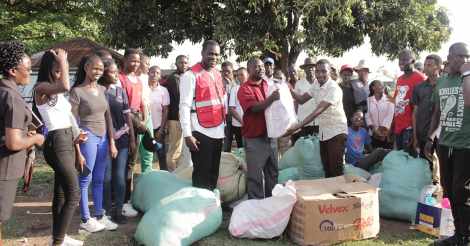
MMUST, Kenya RedCross Kisumu, and University Chaplaincy, handing over donations to the Chief of Ogenya Israel Camp, Mr. Bonface Adede.
The Dean of the School of Disaster Management and Humanitarian Assistance, Dr. Ferdinand Nabiswa, emphasized the significance of the visit, commending students for their resilience, dedication, and willingness to apply theoretical knowledge in real-life situations. “This visit is not just about fulfilling academic requirements; it is about developing compassionate professionals who understand the realities of disaster response and humanitarian aid,” he stated.
Dr. Nabiswa underscored the value of such field experiences in shaping competent disaster management professionals capable of risk assessment, mitigation planning, and collaborating with humanitarian organizations. “As climate change continues to intensify the frequency and severity of disasters, the demand for well-trained experts in this field has never been greater. MMUST remains committed to equipping students with the knowledge, skills, and ethical responsibility needed to respond effectively and make a real difference in society,” he affirmed.
Further, he also highlighted that feedback from industry stakeholders has been overwhelmingly positive, with many employers commending MMUST students for their strong inclination toward practical applications and problem-solving in disaster management. Dr. Nabiswa attributed this success to MMUST’s integrated approach, which seamlessly combines hands-on field experience with robust in-house practical training, reinforcing the curriculum throughout the students’ four years of study.
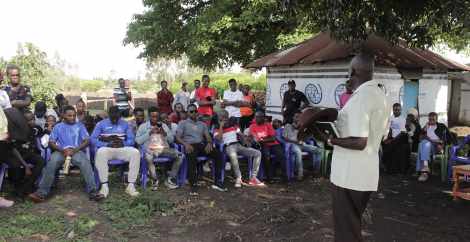
After touring the flood-affected areas, the Disaster Chairman of Kanyagwal Location, Mr. Phanuel Akong’o Origa, addresses students and community members at a forum.
Dr. Betty Opilo, a faculty member at the School, urged students to cultivate resilience, adaptability, and a strong ethical foundation as they advance in their studies and careers. She emphasized that disaster management is not just a course but a calling to serve vulnerable communities in times of crisis.
Dr. Opilo encouraged the students to actively engage with professional humanitarian organizations such as the Kenya Red Cross and St. John Ambulance, highlighting their role in shaping disaster management practices. “Joining such organizations before graduation will give you practical exposure, strengthen your professional networks, and further equip you with hands-on experience that is essential in this field,” she advised.
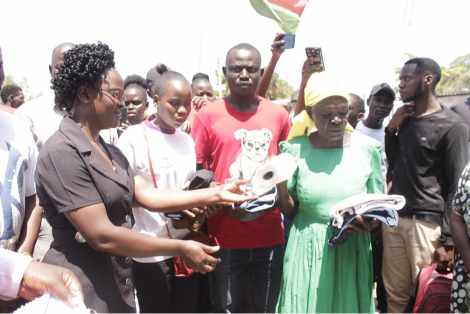
Dr. Betty Opilo (left), a faculty member at SDMHA, hands over donations to an elderly woman.
While engaging with the students, the Chief of Ogenya Israel Camp, Mr. Bonface Adede, highlighted the devastating impact of recurrent floods on Nyando residents, trapping them in cycles of hardship and vulnerability. He noted that frequent flooding disrupts key economic activities such as farming and fishing, stripping families of their livelihoods and exposing them to hunger and poverty.
“With schools submerged and relocated far away, access to education has been severely compromised. Food insecurity has forced many young people to drop out to support their families, with young girls particularly affected, some leaving school due to early pregnancies,” he stated.
Mr. Adede also raised concerns about insecurity in the camps, where the absence of electricity leaves residents dependent on solar lighting, an option many cannot afford. Poor sanitation has heightened the risk of waterborne diseases, while access to healthcare remains a challenge, with residents forced to travel long distances for medical services.
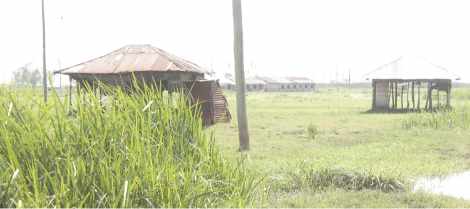
Destroyed homes and a flood-submerged school stand as haunting reminders of nature’s fury.
The Disaster Chairman of Kanyagwal Location, Mr. Phanuel Akong’o Origa, urged the students to extend their impact beyond field visits by conducting research that could inform authorities and guide sustainable solutions for flood mitigation. He emphasized their vital role as future disaster management professionals in shaping policies and interventions to improve the lives of affected communities.
Mr. Origa also expressed gratitude for their generosity, acknowledging that their donations of food, clothing, and hygiene items would provide much-needed relief to displaced families.
Ms. Wavinya Muisyo, one of the participating students, expressed gratitude on behalf of her peers for the opportunity to witness and contribute to disaster response efforts.
“It was a humbling experience to see the resilience of these families despite the immense challenges they face. This visit has broadened our understanding of disaster management beyond the classroom. It has also given us a deeper awareness of the region’s challenges, and we are now committed to collaborating with relevant organizations to provide aid and implement practical solutions within our capacity,” she said.
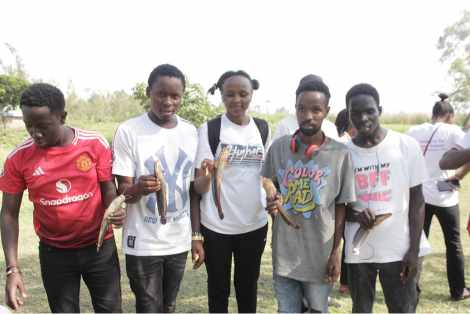
A section of students showcases mudfish caught from the flooded area.
Nyando Sub-county experiences frequent flooding, primarily due to the backflow of water from Lake Victoria, worsened by an oversaturated waterbed and continuous heavy rainfall. Rising lake levels force rivers, including the Nyando River, to overflow, inundating homes, farms, and infrastructure. Poor drainage systems and deforestation further exacerbate the crisis by reducing the land’s ability to absorb excess water. Consequently, thousands of residents face displacement, crop destruction, and outbreaks of waterborne diseases, while key economic activities such as agriculture and trade suffer severe disruption, deepening the region’s vulnerability.
Compared to last year’s visit, Nyando’s situation is gradually evolving as residents explore alternative ways to sustain their livelihoods. Many locals, including men, women, and youth, have turned to small-scale fishing as a source of income. Additionally, efforts are underway to embrace innovative economic activities such as producing charcoal briquettes from organic waste. To enhance food security and adapt to environmental changes, some residents have also begun planting drought-resistant crops like sorghum and rice in shallow, waterlogged areas.
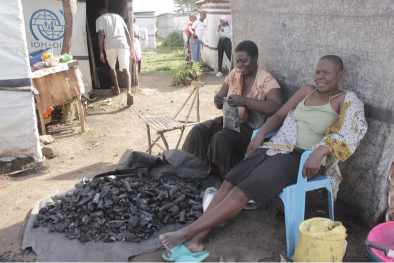
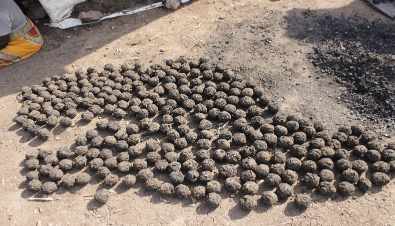
A woman showcases innovation in action, transforming organic waste into eco-friendly charcoal briquettes
With backflow flooding becoming a recurrent disaster in Nyando, experts emphasize the need for sustainable interventions. Key measures include the construction and maintenance of proper drainage systems, reinforced dykes to prevent water overflow, and controlled water release mechanisms to regulate flooding. Additionally, restoring wetlands and implementing afforestation projects can help enhance the land’s capacity to absorb excess water. These interventions are critical in mitigating future crises and safeguarding the livelihoods of affected communities.
As one of the leading institutions in higher education in the Western region offering specialized training in Disaster Management and Humanitarian Assistance, MMUST is already taking steps to implement some of these sustainable solutions. The university is actively engaged in research, policy advocacy, and community outreach to develop long-term flood mitigation strategies. Through collaboration with key stakeholders, MMUST aims to enhance early warning systems, improve drainage infrastructure, and equip students with practical skills to address real-world disasters.
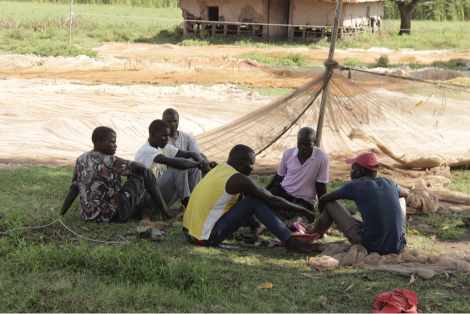
A group of fishermen sits patiently, waiting for the perfect hour to cast their nets.
By integrating academic training with hands-on experience, MMUST is not only preparing the next generation of disaster management professionals but also positioning itself as a leader in disaster resilience and response. This initiative underscores the university’s commitment to transforming knowledge into action, ensuring that communities like Nyando receive the support they need to build a more secure and sustainable future.
By Caren Nekesa




